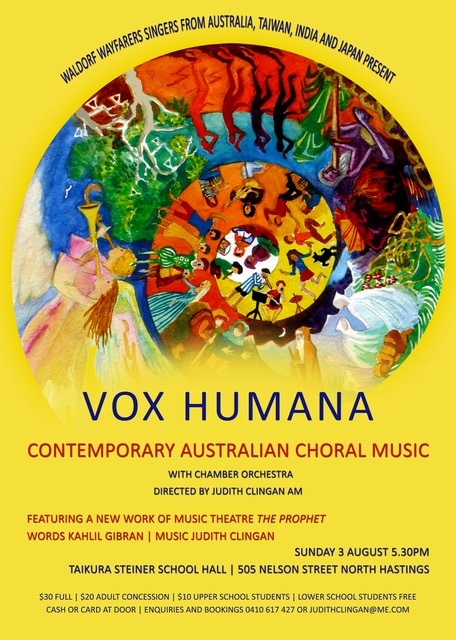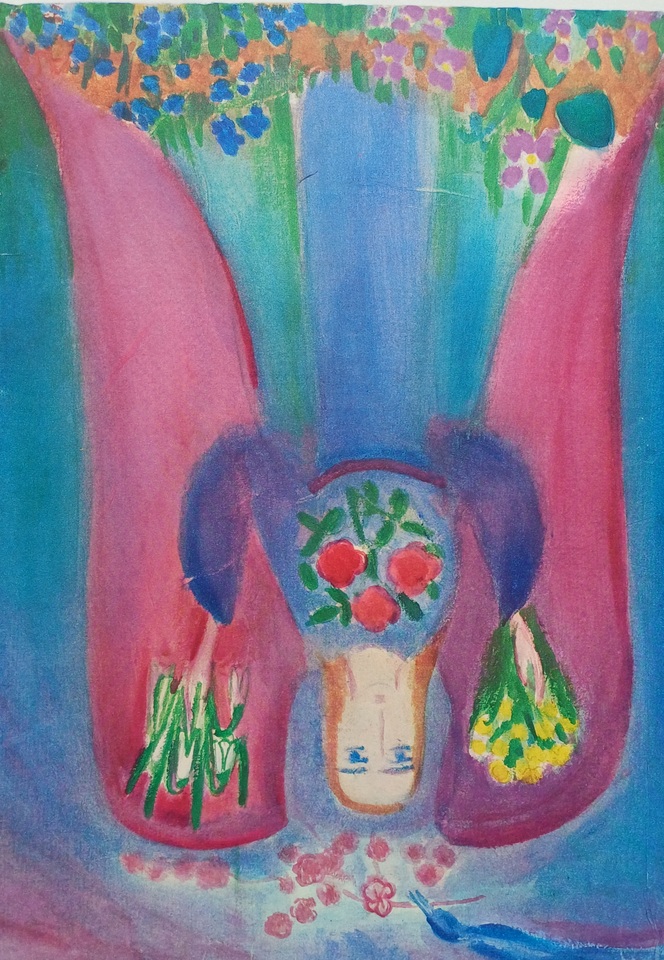Anthroposophy in Hawke's Bay
Rudolf Steiner Centre, 401 Whitehead Road, Hastings
Events over next 2 weeks
[3 July to 17 August]
- Sunday 3 August. at Taikura School Hall, 505 Nelson Street North.
2 - 4pm. Choral Workshop with Judy Clingan, for everyone who loves singing [$20 at door];
5:30 pm. Waldorf Wayfarers with Singers from Australia, Taiwan, India and Japan present
Vox Humana - contemporary Australian Choral Music. [$30 full; $20 adult concession; $10 HS student; primary free]
- Monday evening reading circle starts "The Spiritual Origins of Eastern Europe and the Future Mysteries of the Holy Grail" by Sergei O. Prokofieff (2016) this Monday 4th August. 7pm. Chris Bacchus.
- Friday 8 August, 7pm. Study Group: Rudolf Steiner's Michael letter "Man in his macrocosmic nature" p168 and Leading Thoughts 168 to 170.
- Monday 11 August. 5pm. Michelle Vette talk on 'Spiritual Foundation of Morality' *
~~~~~
*A talk by Michelle Vette will take place at the Rudolf Steiner Centre on
Monday 11 th August.
with Soup and bread at 5 o’clock, (a koha would be appreciated)
Followed by the presentation at 5.30pm.
". . . As we consider our daily lives, and the intentions behind the lives we have come
to, a current quandary is the question of Morality. What does this mean today, how
do we consider and act upon Rudolf Steiner's advice that for every step we take in
spiritual development we need to take two in moral development.
Looking at the lectures in the Spiritual Foundation of Morality* and the Bridge lecture** I
would like to open and invite conversation on this theme."
*There will be prepared material I will bring and then we can take up discussion.
Michelle.
If you want to read in preparation:
* GA 155. The Spiritual Foundation of Morality - Rudolf Steiner Archive
** The Bridge Between Universal Spirituality and the Physical Constitution of Man
GA 202. The Bridge Between Universal Spirituality and the Physical Constitution of Man (1958) - Rudolf Steiner Archive
~~~~~
Not to be Missed!!
Hans and Ineke in Christchurch wrote:Last night we went to the concert of Vox Humana, 50 young people from many countries performing music, choir and a story combining acting with music.
We had a wonderful evening and would like to ask you to say something of their coming to Hastings in the news letter.
Many of them are ex-Waldorf students and it was special to see students from so many different countries working together.
 ~~~~~
~~~~~
Natura

In July, Chris spoke of Rudolf Steiner’s colleagues, one of whom was Albert Steffen.
This is a copy of one of Steffen’s paintings called Natura. The sprouting, growing, and creative forces of Natura (nature) can be seen all around us, now that spring is drawing near.
Albert Steffen, (1884 - 1963) was born in Switzerland and later became a student in Berlin. Here are a few quotes from his comprehensive diaries*:
“In order to penetrate life in all its depths, I moved into a street where squalor and misery ruled.”
One evening “In full consciousness and clearest judgement, I saw a spirit-form rise up from the black, narrow courtyard. It was shaped out of lust, desire for destruction, and woeful self-torment. … Out of this inner sound I heard a soul’s downfall. It was like a cry for help… a violent urgent warning to find the word of redemption.”
“I recounted this experience to a friend, who directed my attention to Rudolf Steiner.” Several months later, in spring, 1907 Albert Steffen attended a lecture and talked with Rudolf Steiner, who spoke of the years as an apprentice, a journeyman and a master.
Albert Steffen wrote, “Here is the master and here is the apprentice. For me the time to wander has come…. While he spoke, I resolved to become worthy of this meeting by transforming myself.”
Albert Steffen attended as many lectures as possible; helped carve the architraves and capitals at the first Goetheanum; continued writing poems, plays and novels; practiced art; accompanied Rudolf Steiner on many occasions, becoming a trusted friend; witnessed the burning of the first Goetheanum and the laying of the foundation stone for its successor; was a member of the original Vorstand and was with Rudolf Steiner in his last months and days. These are just a few of his involvements with Anthroposophy.
*Albert Steffen wrote Meetings with Rudolf Steiner in 1926. (The Centre library has 2 copies.)
Diana Bacchus
Items that were repeated each week in previous Newsletters are available via these links:
Future Events Regular Groups
Newsletters are published every Sunday on www.anthrohb.nz/News and may be accessed at anytime, but they are archived after 6 months.
Items, Notices, Letters, or articles of interest to the Hawkes Bay Anthroposophical community are most welcome. Please email your text by midday Saturday to the Editor at info@anthrohb.nz with"For AnthroHB News" in the subject line. Diagrams and pictures need to be in .jpeg or .jpg format.
Robin Bacchus, Editor
Love and Its Meaning In The World
GA 143
When we say that at the present point of time in his evolution man must learn to understand the Christ Impulse, the thought may well occur: What, then, is the position of one who has never heard of the Christ Impulse, may perhaps never even have heard the name of Christ? Will such a man be deprived of the Christ Impulse because he has not heard the name of Christ? Is it necessary to have some theoretical knowledge of the Christ Impulse in order that Christ's power may flow into the soul? We will clarify our minds about these questions by the following thoughts concerning human life from birth until death.
The human being comes into the world and lives through early childhood in a half-sleeping state. He has gradually to learn to feel himself as an “I”, to find his bearings as an “I”, and his life of soul is constantly enriched by what is received through the “I”. By the time death is approaching, this life of soul is at its richest and ripest. Hence the vital question arises: What of our life of soul when the body falls away? It is a peculiarity of our physical life and of our life of soul that the wealth of our experience and knowledge increases in significance the nearer we approach death; but at the same time certain attributes are lost and replaced by others of an entirely different character. In youth we gather knowledge, pass through experiences, cherish hopes which as a rule can only later be fulfilled. The older we grow, the more do we begin to love the wisdom revealed by life. Love of wisdom is not egoistic, for this love increases in the measure in which we draw near to death; it increases in the measure in which the expectation of gaining something from our wisdom decreases. Our love for this content of our soul steadily increases. In this respect Spiritual Science may actually become a source of temptation, inasmuch as a man may be led to believe that his next life will depend upon the acquisition of wisdom in this present life. The effect of Spiritual Science may be an extension of egoism beyond the bounds of this present life, and therein lies danger. Thus if wrongly understood, Spiritual Science may act as a tempter—this lies in its very nature.
Love of the wisdom acquired from life may be compared with the flowering of a plant when the necessary stage of maturity has been reached. Love arises for something that is contained within ourselves. Men have often made the attempt to sublimate the impulse of love for what is within themselves. In the Mystics, for example, we find evidence of how they strove to transmute the urge of self-love into love of wisdom, and to let this love ray out in beauty. By sinking in contemplation into the depths of their own soul-life they strove to become aware of the Divine Spark within them. But the truth is that the wisdom which man acquires in life is only the means whereby the seed of his next life is unfolded. When a plant has completed its growth through the year, the seed remains. So it is with the wisdom acquired from life. Man passes through the Gate of Death and the spiritual core of being in its process of ripening is the seed of the next life. A man who feels this may become a Mystic and mistake what is only the seed of the next life to be the Divine Spark, the Absolute. This is his interpretation of it because it goes against the grain for a man to acknowledge that this spirit-seed is nothing but his own self.
Meister Eckhart, John Tauler, and others, spoke of it as the “God within”, because they knew nothing of reincarnation. If we grasp the meaning of the law of reincarnation we recognise the significance of love in the world, both in a particular and in a general sense. When we speak of karma, we mean that which as cause in the one life has its effect in the next. In terms of cause and effect we cannot, however, speak truly of love; we cannot speak of a deed of love and its eventual compensation. True, if there is a deed, there will be compensation, but this has nothing to do with love. Deeds of love do not look for compensation in the next life.
Suppose, for example, that we work and our work brings gain. It may also be that our work gives us no joy because we do it simply in order to pay off debts, not for actual reward. We can imagine that in this way a man has already spent what he is now earning through his work. He would prefer to have no debts, but as things are, he is obliged to work in order to pay them. Now let us apply this example to our actions in general. By everything we do out of love we pay off debts. From an occult point of view, what is done out of love brings no reward but makes amends for profit already expended. The only actions from which we have nothing in the future are those we perform out of true, genuine love. This truth may well be disquieting and men are lucky in that they know nothing of it in their upper consciousness. But in their subconsciousness all of them know it, and that is why deeds of love are done so unwillingly, why there is so little love in the world. Men feel instinctively that they may expect nothing for their “I” in the future from deeds of love. An advanced stage of development must have been reached before the soul can experience joy in performing deeds of love from which there is nothing to be gained for itself. The impulse for this is not strong in humanity. But occultism can be a source of powerful incentives to deeds of love.
Our egoism gains nothing from deeds of love—but the world all the more. Occultism says: Love is for the world what the sun is for external life. No soul could thrive if love departed from the world. Love is the “moral” sun of the world. Would it not be absurd if a man who delights in the flowers growing in a meadow were to wish that the sun would vanish from the world? Translated into terms of the moral life, this means: Our deep concern must be that an impulse for sound, healthy development shall find its way into the affairs of humanity. To disseminate love over the earth in the greatest measure possible, to promote love on the earth—that and that alone is wisdom.
to continue reading, go to https://rsarchive.org/Lectures/GA143/English/Singles/19121217p01.html
~~~~~~~~~~